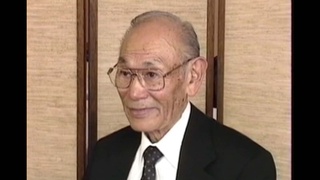Interviews
Company in Tokyo burned down (Japanese)
(Japanese) Even if I want to go home, I can’t so it’s useless. There’s no use thinking about it.
I*: During the war, if Pearl Harbor hadn’t been attacked, would you be in Japan now?
Yeah, of course. I was going to go back to Japan. I had started a company in Tokyo.
I: What happened to that company? What happened to that company? That company in Tokyo?
It burned down. Burned down. Even though I had built a company it burned up.
* "I" indicates an interviewer (Eriko Yamamoto).
Date: October 14 & 17, 2004
Location: California, US
Interviewer: Eriko Yamamoto
Contributed by: Watase Media Arts Center, Japanese American National Museum.
Explore More Videos

Four sisters had international marriages (Japanese)
(b. 1937) A war bride from Yokohama

The reason to stay in Japan after his third year
Japanese American Creative designer living in Japan

Lack of political power led to camps
(1924-2018) Researcher, Activist

Choice to move east or go to Japan
(b.1920) Japanese Canadian Nisei. Established the Ikenobo Ikebana Society of Toronto


Institutionalization as a bad aspect of camp
(1924-2018) Researcher, Activist

State Department records show concern for treatment of Japanese American internees
(1924-2018) Researcher, Activist

Remembering December 7, 1941
(1923-2011) Lawyer, MIS veteran, founder of Francis and Sarah Sogi Foundation

Meeting Japanese Americans from the mainland in MIS
(1923-2011) Lawyer, MIS veteran, founder of Francis and Sarah Sogi Foundation

Awareness of concentration camps as a Japanese American
(1923-2011) Lawyer, MIS veteran, founder of Francis and Sarah Sogi Foundation

Manhunt
(1919 - 2005) Challenged the constitutionality of Executive Order 9066.

The Final Verdict
(1919 - 2005) Challenged the constitutionality of Executive Order 9066.


Search of family home by the FBI following the bombing of Pearl Harbor
(1937 - 2021) Teacher

Not recognizing father after reunion at Crystal City, Texas
(1937 - 2021) Teacher
